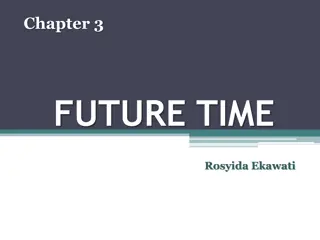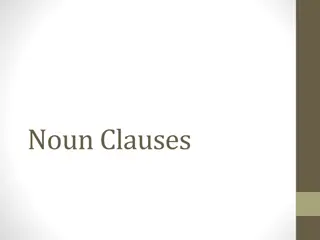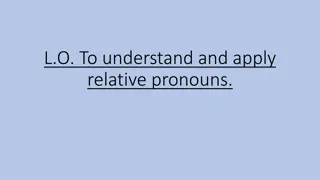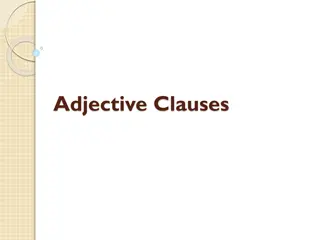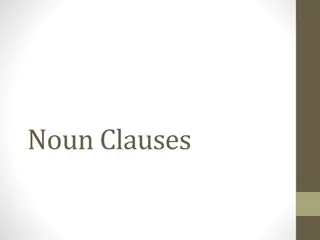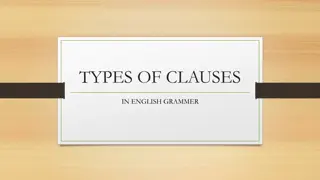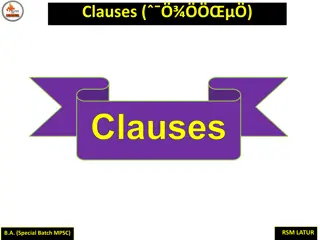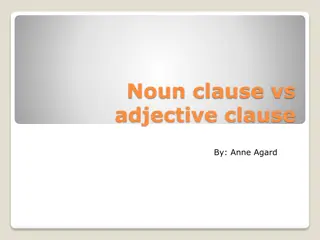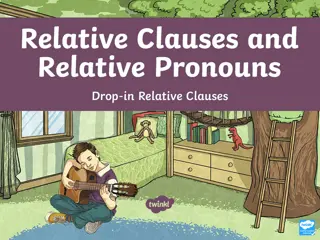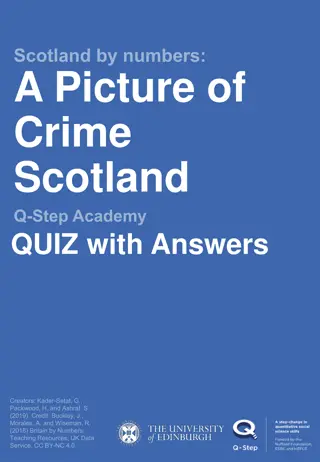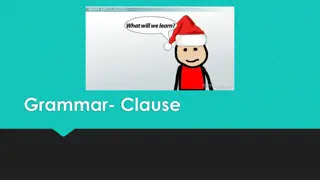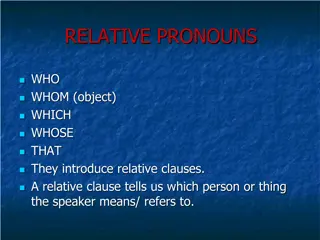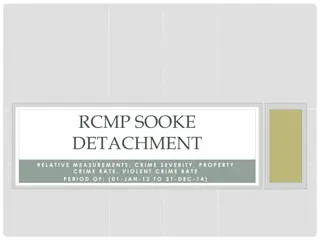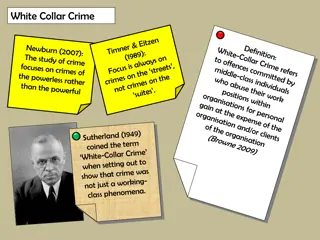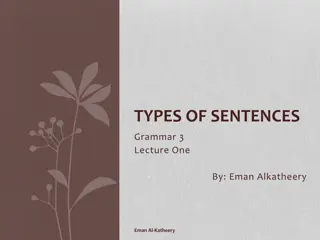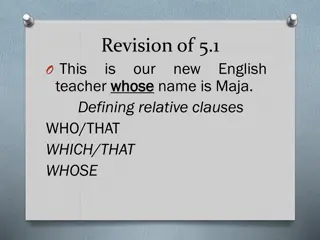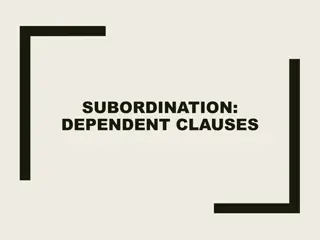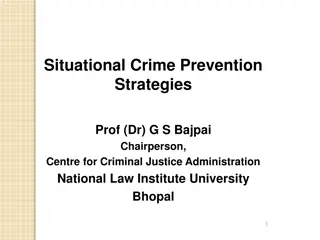Crime Vocabulary and Grammar: Murder Mystery Exercises and Relative Clauses
Explore crime-related vocabulary like rob, steal, burgle, and murder in the context of a murder mystery story. Practice exercises on robbery, theft, and murder, then delve into relative clauses with examples and explanations. Enhance your understanding of crime terminology and grammar concepts.
Download Presentation

Please find below an Image/Link to download the presentation.
The content on the website is provided AS IS for your information and personal use only. It may not be sold, licensed, or shared on other websites without obtaining consent from the author.If you encounter any issues during the download, it is possible that the publisher has removed the file from their server.
You are allowed to download the files provided on this website for personal or commercial use, subject to the condition that they are used lawfully. All files are the property of their respective owners.
The content on the website is provided AS IS for your information and personal use only. It may not be sold, licensed, or shared on other websites without obtaining consent from the author.
E N D
Presentation Transcript
11B Murder mystery Vocabulary: crime Vocabulary: crime Grammar: relative clauses Grammar: relative clauses Review: Predent Perfect; Past Simple passive Review: Predent Perfect; Past Simple passive
Crime Please, open your book, p.86, and try to do execrcises 1 and 2. Find below help with new vocabulary referringto crime. You can steal steal money and things, but not people or banks. You can rob rob people and banks, but not money or things. You can burgle burgle houses and flats, but not banks or cars. If you murder murder someone, you kill him/her deliberately. If you break into break into a building or a car, you enter it by breaking omething (e.g. A window, a lock, etc.). You put bullets bullets in a gun. You use a gun to shoot shoot people, animals or things. If a crime happens to you, you are a victim a victim. If the police think you stole something or murfered someone, you are a suspect a suspect. If the police arrest arrest you, they catch you and take you to the police station for questioning.
TIPS! Rob, steal Rob, steal and burgle different objects in a sentence: rob a bank, steal money, burgle houses, etc. burgle all mean take something that isn t yours . We use them with You can say I was burgled to mean My house/flat was burgled. We often use crime verbs in the passive: My car was stolen. A man was arrested. We often use the verb commit crime? commit with the word crime: Have you ever commited a verb verb criminal criminal crime crime rob robber robbery steal thief theft burgle burglar burglary murder murderer murder
Now, do execrcise 4 on the page 86. Answers: 1. robbed; stole; robbery 2. Broken into; stolen 3. murdered; arrested; suspects; murder 4. burgled; stolen Please, do exercises 1 and 2, p56, Workbook Answers (ex.2): 2. stolen; 3. suspects; 4. burglaries ; 5. shot; 6. bullets; 7. arrested; 8. murder; 9. victim; 10. robbery; 11. thief
Grammar: relative clauses Grammar: relative clauses Relative clauses are clauses starting with the relative pronouns who*, that, which, whose, where, when. They are most often used to define or identify the noun that precedes them. Here are some examples: Do you know the girl who started in grade 7 last week? Can I have the pencil that I gave you this morning? A notebook is a computer which can be carried around. I won't eat in a restaurant whose cooks smoke. I want to live in a place where there is lots to do. Yesterday was a day when everything went wrong! * There is a relative pronoun whom, which can be used as the object of the relative clause. For example: My science teacher is a person whom I like very much. To many people the word whom now sounds old-fashioned, and it is rarely used in spoken English. Relative pronouns are associated as follows with their preceding noun: Note 1: The relative pronoun whose is used in place of the possessive pronoun. It must be followed by a noun. Example: There's a boy in grade 8 whose father is a professional tennis player. (There's a boy in grade 8. His father is a professional tennis player.) Note 2: The relative pronouns where and when are used with place and time nouns. Examples: FIS is a school where children from more than 50 countries are educated. 2001 was the year when terrorists attacked the Twin Towers in New York
Preceding noun Preceding noun Relative pronoun Relative pronoun Examples Examples a person who(m)/that, whose - Do you know the girl who .. - He was a man that .. - An orphan is a child whose parents .. a thing which /that, whose - Do you have a computer which .. - The oak a tree that .. - This is a book whose author ..
Now, do execrcise 8 on the page 87. Answers: 2. where; 3. who; 4. who; 5. that/which; 6. where Please, do exercises 3, 4 and 5, p57, Workbook For more information on Relative clauses please visit https://www.perfect-english-grammar.com/relative-clauses.html
Thank you for your attention! #Stay safe #Stay home Lecturer Ivana Mila i ivana.milacic@udg.edu.me


